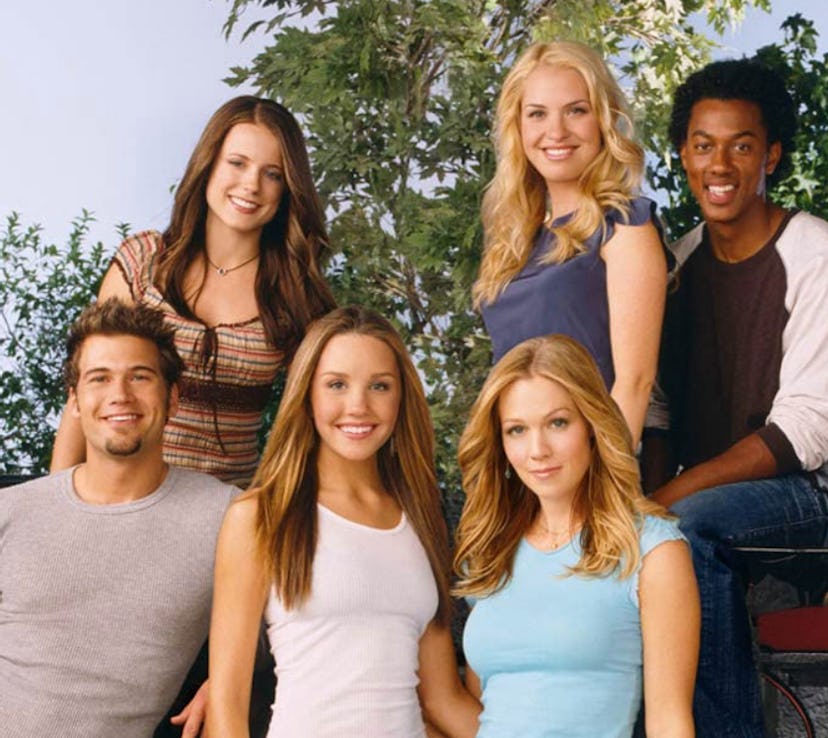Welcome to W TV Club, in which W magazine chooses a television show they’d recommend you binge-watch. Our December picks will be a selection of series that center the idea of friends and family—which happens to be the theme for our latest issue. This week, writer Kyndall Cunningham recommends The WB comedy series, What I Like About You.
It’s hard to overstate the influence of The WB (and its successor network, The CW,) in shaping the cultural tastes of millennials, particularly with the genre of teen and teen-targeted soaps. Successful series such as Dawson’s Creek, Buffy The Vampire Slayer, Smallville, One Tree Hill and, later, Gossip Girl helped the network find its niche by attracting young, female audiences while testing the limits of how pleasantly ridiculous and, dare I say, camp, primetime television could be.
Comedies, on the other hand—with the exception of the smash hit Reba—were always a harder sell for the frog network. While many of its ’90s and early 2000s sitcoms developed a beloved cult following and gained a larger viewership through syndication, ratings paled in comparison to the primetime selections on ABC, CBS, NBC, and UPN, with which The WB would eventually merge. Likewise, it’s an interesting exercise in pop culture research to revisit the channel’s mid- to low-performing sitcoms and see which stories aged poorly or which were ahead of their time. For me, the ultimate WB relic to consume currently features one of the biggest teen stars of the early aughts, and is available to stream on HBOMax—What I Like About You.
I was seven or eight years old when I first discovered What I Like About You. My sister’s VHS copy of Bynes’s 2003 comedy film What A Girl Wants, which I constantly kept in my possession, featured a promo for the series. By that time, I was already deeply familiar with Bynes as a Nickelodeon star and studied her as a paradigm of humor and coolness. I didn’t actually sit down with WILABY until its afternoon-rerun era on The CW. However, I immediately became engrossed in the immaculately hip world of the show, not solely because I worshipped Bynes but because it offered me, a working-class kid from a mostly uneventful town, a fantasy of what young adulthood looked like—embodied by hot, funny, financially stable (albeit, mostly white) people in New York City.
Re-watching it as an adult, however, I was mostly struck by how the show nails the sororal dynamic between Holly (Bynes) and Valerie Tyler (Jennie Garth), which always felt intimately close to my own. Like Fleabag, it presents the innately hilarious tension between the older sister, who disproportionately bears the expectations of their parents and tries to conform to society’s notions of success—although, we don’t see or hear much about them throughout the show— and the younger sister, who, by their example, feels more free to become their own individual. The series is also bolstered by WB staple Leslie Grossman as Val’s best friend and coworker Lauren, who portrays a hilarious mixture of self-deprecation and shamelessness. Wesley Jonathan marvelously (and attractively) portrays Holly’s guileless best friend Gary. And on the subject of himbos, I must mention former MTV VJ and adult film star Simon Rex’s season-one tenure as Val’s earnestly dimwitted boyfriend, Jeff, who was abruptly given the boot but nevertheless played the Internet archetype to a T.
When not focused on family dynamics, What I Like About You serves as a serialized rom-com as we watch Holly and Val manage a constant rotating door of boyfriends, flings, and occasional douchebags. While the show has a heavy focus on Holly and Val’s romantic lives, their sisterly bond is never taken for granted by the writers or presented solely as something to fall back on when their relationships with men fail, but as something that needs to be nurtured and maintained.
Of course, rewatching this series as a Bynes fan comes with some emotional baggage, too. During the show’s funniest moments, you can’t help but mourn what could’ve been for the promising actress before a series of legal troubles and mental health issues brought her career to a halt in the early 2010s.
During a time of reckoning for famous (predominantly white) women who’ve faced harassment and bullying in the media, she seems like a likely project for fans eager to rehabilitate her image and seek some justice for her public mistreatment. Whether that moment arrives or not, Bynes’s art and comedic genius still remains.
